- Home
- Blog
- Oracle PL SQL
- Oracle Interview Questions

Oracle is an American multinational computer technology company with its headquarters in Austin, Texas. Oracle sells cloud-engineered systems, database software and technology, and enterprise software, especially its own brands of database management systems.
Oracle's growing popularity in the IT industry is due in large part to its great work culture and values. Of course, its high-quality products are also a big part of the reason for this. Oracle is a database server that maintains information in a highly organized manner. It lets users save and retrieve relevant data in a multi-user environment, enabling concurrent access to the same data by multiple users.
Top 10 Frequently Asked Oracle Interview Questions
- What exactly is an Oracle database?
- Mention the advantages of the Oracle database.
- What do you mean by data encapsulation in Java?
- What are the merits of static methods and variables?
- Differentiate TreeSet and HashSet in Java.
- What do you mean by protected and global attributes in Python?
- What do you understand by Python Generators?
- Why do you use negative indexing in Python?
- What exactly is OCI API gateway?
- How can you handle exceptions in Oracle Cloud?
Oracle Interview Process
Oracle's hiring staff cultivates an inclusive environment and recruits highly qualified candidates from diverse backgrounds. Oracle is looking for polished problem-solvers with good analytical skills who can handle problems in the modern world.
Oracle Interview Rounds Include
- Online Coding Round
- Phone Screening Round
- Technical Interview Round
- HR Round
- Hired
Online Coding Round
The first phase consists of an online test with multiple-choice questions ranging from logical thinking and quantitative analysis to fundamental concepts such as OOps, data structures, database management, algorithms, and networking. The increased quantity of questions necessitates practice.
The Initial Phone Screen
A human resources recruiter conducts this second round of interviews to evaluate the candidate's qualifications, skills, and experience.
Technical Interview Round
The talents in coding are put to the test. During the interview process with Oracle, a candidate will be asked to respond to two questions based on data structures and algorithms. In this round, we investigate technical questions, puzzles, and initiatives from the past.
HR Round
The interviewer inquires about the applicant's previous job experience as well as their ethics in order to determine whether or not the applicant is a good cultural fit for the company.
Oracle Technical Interview Questions
Oracle Database Interview Questions
1. What exactly is an Oracle database?
It is nothing but a Relational Database Management System (RDBMS) of Oracle Company. It is also known as OracleDB. We can store, manage, as well as retrieve data with the Oracle database seamlessly. It is essential to note that we use SQL to interact with the Oracle database.
Oracle database is a system designed for enterprise grid computing. We can manage data in the Oracle database more flexibly and effectively. Oracle database supports both physical and logical structure. Thus it is possible to organize data stored in physical resources without affecting their logical structures.
| If you want to enrich your career and become a professional in LinkedIn then enroll in Oracle PL SQL Training - This course will help you to achieve excellence in this domain. |
2. When do we use the Coalesce function in Oracle?
This function helps to return the first non-null expression from the expression list. It is one of the advanced functions of Oracle. Note that the coalesce functions return 'NULL' if no non-null expressions exist in the list.
The syntax for the coalesce function is given below:

The syntax of this function can be described in pictorial form as shown below:

Furthermore, we can use this function with CASE expressions, as shown below.

3. Mention the advantages of the Oracle database.
Jotted down are a few advantages of the Oracle database.
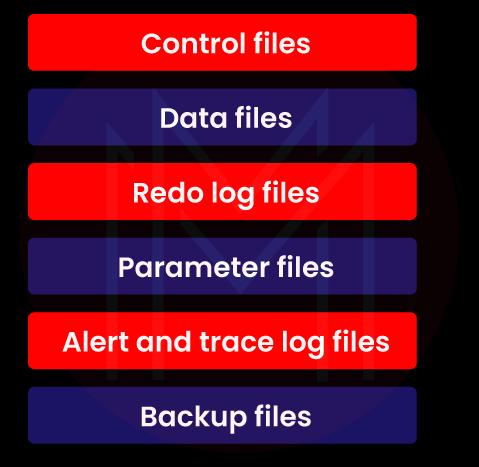
- Oracle database stores the pre-defined type of data
- It supports SQL
- It allows for storing massive amounts of data
- It offers robust security for data
- It will enable seamless data management
- It provides excellent database recovery mechanisms.
4. List the physical components of the Oracle database.
The below graphic shows the physical components of the Oracle database.
5. What do you understand by the Oracle index?
Oracle index is essentially a schema object. It consists of entries for values that exist in the indexed columns of tables in the Oracle database. More to the point, it provides quick as well as direct access to data in the tables.
The crucial thing is that Oracle allows any number of indexes for a single table in a database. As a result, they increase query speed significantly.
There are many types of indexes used in Oracle, as listed below:
- Bitmap indexes
- Function-based indexes
- Partitioned indexes
- Domain indexes.
6. How will you create tables in the Oracle database?
We can use CREATE TABLE statement to create new tables in the Oracle database. When creating new tables, we also need to name the table. Not only that, we need to define each column along with the data type of the tables.
The syntax for creating a table in the Oracle database is given below:
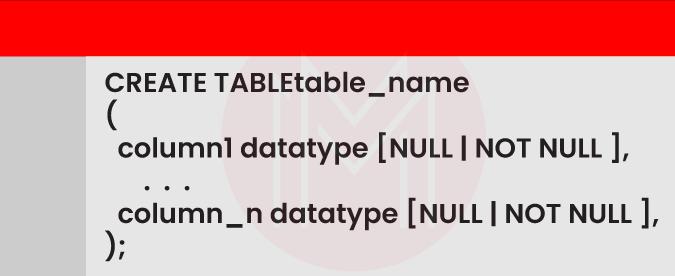
7. How can you identify duplicate rows in the Oracle database?
We can identify duplicate rows in the Oracle database in the following ways.
- By using the HAVING Clause
- By using the rowid pseudo column.
- By using the ROW_NUMBER ( ) window function
8. Briefly describe the database writer process.
The database writer process is nothing but an Oracle background process. This process plays a pivotal role in writing physical database files of Oracle. And it is done at the operating system level.
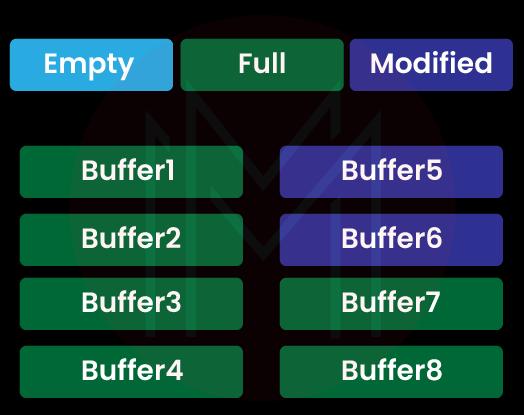
The database writer process also governs the database buffer cache. In other words, this process writes the buffer cache data into the data files of Oracle database.
Know that database writer is a mandatory process in Oracle and is created when we start a database instance.
9. State the differences between Grid and Cluster in the Oracle database.
A cluster is essentially a group of systems that perform the same operations. As a result, it improves performance.
On the other hand, a grid is a collection of multiple clusters. Mainly, it is a type of distributed computing technology.
It is a simple but essential note that Oracle follows the enterprise grid computing model.
10. How will you convert a date into a string in the specified date format?
We shall use the TO_CHAR ( ) function to modify a DATE into a string in the specified format.
We can use the following syntax for this purpose.

Oracle Java Interview Questions
11. What is precisely a comparator in Java?
Java comparator is nothing but a functional interface that we use to sort objects. It compares the objects and then returns an integer. We can use compare ( ) method to sort objects. Besides, We use a comparator for making custom ordering too.
We can create a comparator using the lambda functions. This is because lambda functions accept two objects and then return an integer. Mainly, a comparator doesn’t change any classes.
Moreover, it offers the flexibility to sort data members in multiple ways. For instance, consider a student table. We can sort data members of the student table based on roll number, age, name, or any other.
12. What do you mean by data encapsulation in Java?
Encapsulation improves the security of the elements of a class. In Java, Data encapsulation is a process of bundling data and codes together. In other words, the methods, as well as the variables of a class, are bound as a single bundle.
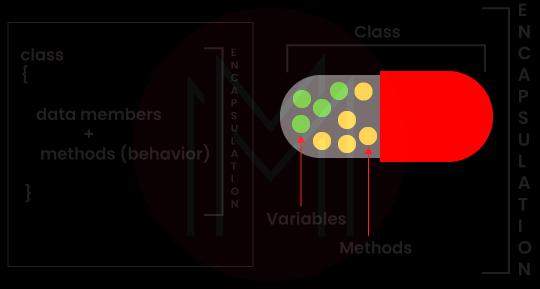
Encapsulation doesn't allow other classes to access encapsulated variables. However, it allows the methods that belong to the same class to access the variables.
13. Why do we use reflection in Java?
Reflection is one of the prime features of Java. It allows manipulating the internal properties of a Java program at runtime. In other words, reflection allows for modifying the behavior of classes, methods, and interfaces during the execution. Note that a Java class can collect the names of all its members.
Further, reflection is widely used in JavaBeans. This is because it is essential to know the properties of classes since they are loaded dynamically.
14. What are the merits of static methods and variables?
Static methods, as well as variables, provide many benefits, as mentioned below:
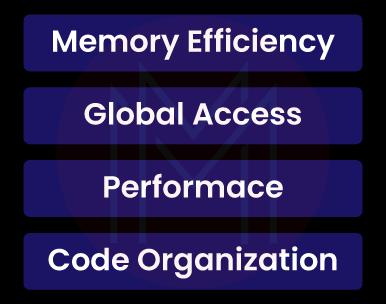
15. Does Java support constructor overloading?
Yes. Java supports constructor overloading. So we can create multiple constructors with the same name. But we must use different numbers of parameters or parameter types.
16. Compare Heap and Stack Memory.
|
Heap |
Stack |
|
It stores JRE objects and classes. |
It stores methods and variables that are temporary. |
|
It doesn’t follow any order. |
It follows the LIFO order. |
|
It takes a longer time to access memory. |
It takes less time. |
|
Memory size is large. |
Memory size is small. |
|
Memory allocation is done randomly. |
It is done continuously. |
|
We can resize variables. |
We cannot them. |
|
It is not thread-safe. |
It is thread-safe. |
17. Why do you use pointers in Java?
In Java, we use pointers to manipulate references. The main thing about pointers is that they are only used in implicit functions.
18. How can you declare infinite loops in Java?
We can declare infinite loops in Java by using the following statements.

19. Distinguish the Final keyword and final class in Java.
The final keyword is a reserved word in Java.
The final variable is the variable modified by a final keyword.
20. Differentiate TreeSet and HashSet in Java.
|
TreeSet |
HashSet |
|
It authorizes heterogeneous objects |
It doesn’t approve of heterogeneous objects. |
|
We can use the 'compare' method to compare two objects. |
We can use the 'equals' method for the same. |
|
It doesn’t allow null objects. |
It allows null objects. |
|
It is slower than HashSet. |
It is faster than TreeSet |
|
It uses TreeMap to store elements. |
It uses HashMap for the same. |
Oracle Python Interview Questions
21. What do you mean by decorators in Python?
Decorators in Python allow users to add new functionalities to existing functions and classes. Mainly, they don't change the structure of the functions and classes. In other words, we use decorators to modify the behavior of classes as well as functions.
22. How will you read a text file in Python effectively?
We must follow the below step-by-step procedure to read text files in Python.
- First, we need to use the open ( ) function for opening text files.
- Then, we must use the readline ( ) and read ( ) functions for reading texts from the files.
- Finally, with the help of the close ( ) method, we can close the text files.
23. What do you mean by protected and global attributes in Python?
Protected attributes can be accessed only within a class or subclasses.
We declare global attributes outside of a class. That’s why they are accessed from any place in the program.
24. What is the role of the scope resolution function in Python?
The scope resolution function follows the LEGB rule. In other words, the LEGB rule is applied to streamline the order of searching namespaces.
The LEGB can be described as follows:
Local Name (L): Variables defined in the current function
Enclosing Function (E): Variables defined inside the nested functions or enclosing functions
Global Module (G): Variables defined at the uppermost level
Built-in Python (B): They are reserved names in Python built-in modules
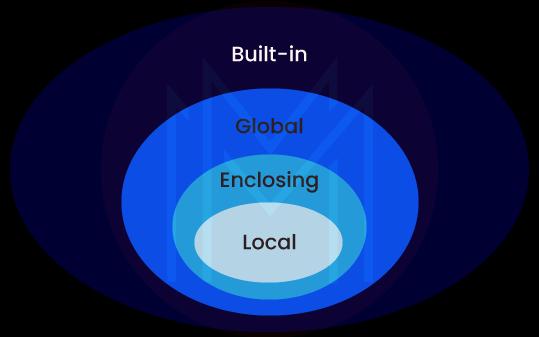
25. What do you understand by Python Generators?
Python generators are essentially functions that create iterators. We use Python generators to produce a large sequence of values. Besides, we can store the sequence of values in memory locations sequentially. We use yield statements in Python generators instead of return statements.
The below code will show the use of yield statements with generators.
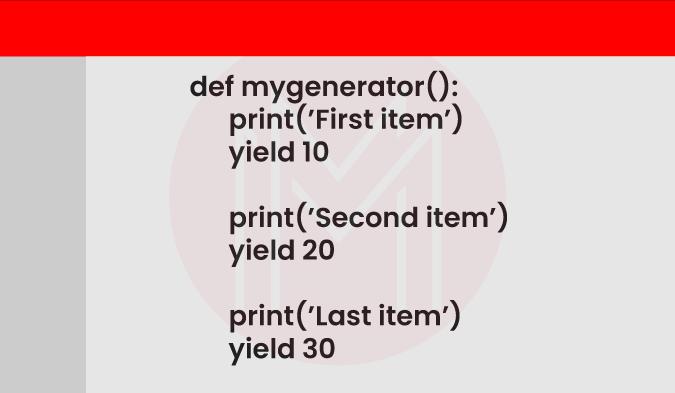
Apart from the above points, know that Python generators are memory-efficient and easy to implement.
26. Why is Python stated as a dynamically-typed language?
In Python, it is unnecessary to declare the variable type before assigning values to the variable. On the contrary, it is mandatory to declare the variable type in other programming languages such as C, Java, C++, etc. Another essential thing is that memory management is simplified in Python.
Because of the above-stated two reasons, Python is known as a dynamically-typed language.
27. State the differences between .py files and .pyc files.
|
.py files |
.pyc files |
|
They contain the source codes of programs. |
They have the byte codes of programs. |
|
The execution speed of these files is slower. |
We can execute these files faster since it contains the compiled codes. |
|
These files contain human-readable Python codes. |
These files contain machine-readable intermediate codes. |
28. Create a Python code to split and then join strings.
Code:
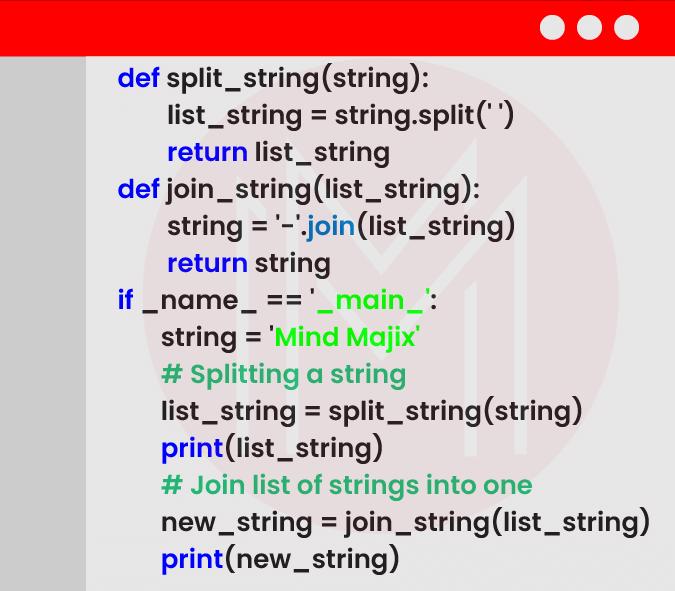
Output:

29. Why do you use negative indexing in Python?
We apply negative indexing in Python to perform slicing from the end of a string. Generally, the slicing function returns a sub-string.
Know that slicing is done based on start, stop, and stop parameters.

30. How can we combine two Pandas data frames in Python?
We can use the concat ( ) function to append rows as well as columns of a data frame to another. Not only that, we can use .join ( ) and merge ( ) functions to combine data frames in Python.
Oracle Cloud Interview Questions
31. What do you mean by Oracle Cloud Infrastructure (OCI)?
OCI is a platform where we can build and run applications. It is a highly-available and consistent cloud environment. It is a high-performance platform that allows users to experience greater satisfaction, speed up their business operations, and reduce risks and costs.
OCI works based on a multi-tenant model. It supports multiple users to get cloud services through a robust network. In OCI, resources are available on demand, and no human effort is required.
OCI has many prime features, as shown in the below image:
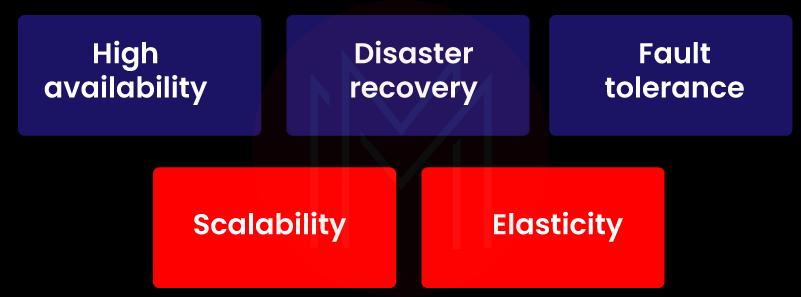
32. What exactly is OCI API gateway?
We use the OCI API gateway to publish APIs with private endpoints. We can access these endpoints within the network. We can create more API gateways in a regional subnet with the help of an API gateway service. It processes traffic from API clients and directs traffic to back-end services.
OCI API gateway allows users to perform managed HTTPS services with a container registry, OCI functions, etc. This gateway also supports to implementation of access control policies. For example, the policies may be a rate-limiting policy to HTTP endpoints or an authentication policy.
33. Why do we use analyze command in Oracle?
In Oracle, we use the 'analyze' command to analyze tables. With the analyze table command, we can count the number of records in a table and know the amount of storage allocated to the tables.
Apart from the above two operations, the analyze command helps count the number of chained rows in a table.
34. What is the role of hash clusters in Oracle?
If we want to improve the data retrieval process, we must store tables in hash clusters. Hash clusters are also known as index clusters. As tables are indexed, we can quickly locate the rows of the tables using the key values. This is because index values are assigned to all the tables stored in hash clusters.
However, Hash clusters are effective only when the tables in the hash clusters are static in size. Unless hash clusters are not kept static, the data retrieval won’t be effective.
[Related Article: Oracle RAC Tutorial]
35. What do you understand by integration in Oracle Cloud?
Oracle integration cloud is basically a lightweight integration solution. With this solution, we can integrate applications in the cloud effortlessly. This is because the solution simplifies connectivity between the cloud and applications.
The significant thing about this tool is that Oracle offers a robust dashboard with which we can flawlessly track the progress of integrating applications in the cloud.
36. How is post-form-commit different from post-database-commit?
The post-form-commit starts once we perform any change in the Oracle database. And we accomplish this process before we finalize transactions.
Conversely, the post-database-commit starts once Oracle forms make the commit for the finalized transactions.
37. How will you identify a resource in Oracle Cloud Infrastructure?
We can identify resources in OCI with the help of Oracle Cloud Identifier. The Oracle cloud identifier is a unique identifier that helps to identify resources in cloud infrastructure using the metadata of the resources. Note that the resources can be a user, instance, group, or service.
[Related Article: What is Oracle Cloud Infrastructure?]
38. Where can you store database backups in Oracle Cloud?
We can store the database backups in the OCI object storage. Also, we can keep the backups locally in the database system.
39. How can you handle exceptions in Oracle Cloud?
We can handle exceptions in Oracle Cloud with the help of an exception handler. This handler processes exceptions effectively.
It is essential to note that the exception handler exists in the exception-handling parts of triggers, blocks, and so on.
[Related Article: Oracle EBS Interview Questions]
40. What are the differences between Oracle EBS and Oracle ERP Cloud?
|
Oracle EBS |
Oracle ERP Cloud |
|
We cannot easily access Oracle EBS. We can access it only on Workstations. |
We can access the Oracle Cloud from anywhere at any time. |
|
Software updates are done manually. It increases cost and human efforts. |
They are done automatically in the ERP Cloud. As a result, it reduces costs and human actions. |
|
The license and maintenance costs are high. |
There is no upfront license cost or maintenance cost. |
|
Complex Integrations cannot be made quickly. |
They can be done promptly. |
|
UI could be more user-friendly. |
It is user-friendly and quick. |
Tips to Crack Oracle Interview
- Listen carefully: You should pay close attention to everything the interviewer says right from the start. If you don't listen carefully, you might miss a chance to impress him, because sometimes the question already has the answer hidden in it. So you should learn how to listen better.
- Don't be too familiar: All interviewers prefer to speak professionally. You should not attempt to create a false sense of familiarity. They are intelligent and can detect all of your deceit within a minute. Therefore, avoid being overly intelligent and communicate appropriately.
- Know and Describe your Strengths - A lot of people who interview at different companies are shy and feel awkward when they are asked to talk about their strengths. Remember that if you don't show off your skills, no one will ever know how good you are at them, and this could end up costing you a lot. So it's fine to think about yourself and talk about your strengths in a clear and honest way when necessary.
- Discuss with your interviewer and continue the discussion. Keep in mind that an interview is not a written exam, so even if you come up with the best solutions to the provided problems, they are worthless unless the interviewer understands what you are saying. Therefore, it is essential to make the interviewer feel included in the process. Additionally, asking questions may always prove beneficial during an interview.
- Ask questions: Most of the time, when an interviewer asks, "Do you have a question?" Most of the people running say no. It is a bad thing to do. You should also ask questions based on the situation. This shows that you're paying attention and are interested. When you ask questions, you can also find out where you fit best in the company. But you should never forget that it shouldn't look fake.
Oracle FAQs
1) What are the questions asked in the Oracle interview?
Asking questions about the company's culture and the technology it uses to make its products is always a good idea.
Asking about what Oracle plans to do in the future could also be a good idea, as it could show the interviewer that you have been looking forward to joining Oracle for a long time.
2) How to prepare for the Oracle interview?
Here are some of the topics to prepare for the Oracle interview:
- DevOps
- System Design
- Data Structure & Algorithm Classes
- Java Backend Developer
- Complete Data Science Program.
- Data Structures & Algorithms in Python.
- Algorithm-Self Paced(JAVA/C++)
- Full Stack Development
3) Are Oracle interviews hard?
Oracle gets a lot of applications, and the competition is tough to get in. Oracle has a long and detailed interview process to find the right person for a job.
4) Is the Oracle interview easy to crack?
Most of the time, the questions at an Oracle interview are easy to moderate.
5) Does Oracle give a good salary?
The highest-paying position at Oracle is Sales Director, with an annual compensation of 45 Lakhs. 10% of employees make greater than 30 lakhs annually. One percent of the population earns more than 51 lakhs each year.
6) What is the basic salary of Oracle?
The basic salary at Oracle depends on the position for which you are applying. The minimum annual salary for an Applications Engineer is 14 Lakhs, and so on.
7) What is Oracle fresher's salary?
At Oracle, the salary range for a new Software Engineer is from 4L-6L.
8) Can I negotiate salary with Oracle?
Yes! Oracle's offers are often subject to negotiations. Oracle may offer good prices for the first part of your contract, but when it's time to renew, when it's not easy to switch to a different solution, they'll try to make up for it.
9) Does Oracle give a joining bonus?
Yes, companies must give their employees a Complementary Annual Bonus. This bonus will be paid out in two parts. The signing bonus is usually the hardest part of an Oracle offer to negotiate since they don't usually include it in their first offers, and if they do, it's usually low.
10) Does Oracle give a yearly hike?
Yes, Oracle does provide an annual bonus to every employee. And the increase will depend on the employee's designation.
Conclusion
Improve your skills to increase your chances of qualifying for an interview by having these Oracle interview questions and answers. We hope that the above list of questions gives you an idea of what Oracle PL SQL is all about. Even if you know everything there is to know about the basics, how you talk about them in the interview is very important. So, keep your mind cool and go into the interview with confidence and without any fear to ace the interview. All the best
 On-Job Support Service
On-Job Support Service
Online Work Support for your on-job roles.

Our work-support plans provide precise options as per your project tasks. Whether you are a newbie or an experienced professional seeking assistance in completing project tasks, we are here with the following plans to meet your custom needs:
- Pay Per Hour
- Pay Per Week
- Monthly
| Name | Dates | |
|---|---|---|
| Oracle PL SQL Training | Feb 24 to Mar 11 | View Details |
| Oracle PL SQL Training | Feb 28 to Mar 15 | View Details |
| Oracle PL SQL Training | Mar 03 to Mar 18 | View Details |
| Oracle PL SQL Training | Mar 07 to Mar 22 | View Details |

Madhuri is a Senior Content Creator at MindMajix. She has written about a range of different topics on various technologies, which include, Splunk, Tensorflow, Selenium, and CEH. She spends most of her time researching on technology, and startups. Connect with her via LinkedIn and Twitter .















